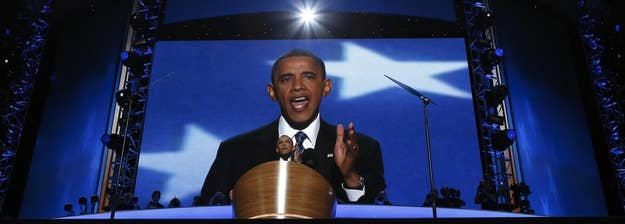
CHARLOTTE, NC — On Tuesday night, Michelle Obama reintroduced the country to the president as a loving husband and father. On Wednesday night, Bill Clinton vigorously defended the president’s economic record. And on Thursday night, President Barack Obama flatly if efficiently laid out the closing argument for his campaign, leaving the 2008 message of “Hope and Change” firmly in the past, and outlining a case for his reelection that merges policy and character.
“That hope has been tested – by the cost of war; by one of the worst economic crises in history; and by political gridlock that’s left us wondering whether it’s still possible to tackle the challenges of our time,” Obama said, adding later: “The times have changed – and so have I.” Obama spoke before a simple image of an American flag, in a utilitarian setting reflecting the national undercurrent of economic fear and insecurity.
In a nearly 40-minute address, Obama drew an implicit, but forceful contrast with Mitt Romney, outlining a series of promises for the next four years.
But with an economy still stumbling its way out of what Obama called the “Great Recession,” his final pitch is now focused on “a set of goals for our country,” as the campaign put it. Those goals include boosting the manufacturing and energy sectors, increasing funding for education, extending a generally pragmatic national security strategy, and reducing the deficit, the Obama campaign said.
Tomorrow morning, Obama leaves on swing state tour, hitting New Hampshire, Iowa, and Florida, with Nevada and Colorado on the agenda for next week. The polls are staying tight — despite multiple high profile visits in those states — and early voting begins this month. The struggle to retain the White House, Obama acknowledged tonight, was not inspiring as it was four years ago. “So you see, the election four years ago wasn’t about me. It was about you. My fellow citizens – you were the change.
Post-convention, Obama plans to frame the race as a high minded debate over the issues while at the same time making each one of those policy discussions extremely personal.
On the economy, Chicago has been aggressively pushing the idea of Romney as untrustworthy steward, a tax evading businessman with tons money to hide. (The campaign helpfully began suggesting to reporters as early as eighteen months ago to ask for the release of his tax returns.) The tactic will pay dividends for at least one other news cycle between now and November 6th. Romney still hasn’t released his full 2011 tax return; aides say they will before October 15th.
The post-convention tax disclosures are likely to trigger another round of head scratching from the media and political class, too. The DC elite—along with Obama campaign officials —have been baffled by Boston’s inability to put the issue to rest. Romney’s failure to mention the Afghanistan War or the nation’s servicemembers in Tampa ensured that foreign policy would become a more high profile issue in the final stretch.
Obama devoted 527 words of his acceptance speech to foreign policy, as the Obama campaign took advantage of a new opportunity to exploit the differences in the two candidates national security records. Team Obama is trying to do the same thing with foreign policy as they did with the economy: centering the debate around Romney's character. In an earlier prime-time speech, Senator Kerry compared Mitt Romney and Paul Ryan to Sarah Palin, implying a certain cluelessness and naïvete in their dealings with the world.
Vice President Joe Biden suggested that Mitt Romney was so out of touch with Americans that he couldn’t understand the need to “move heaven and Earth” to kill Osama bin Laden.
Obama himself piled-on with a zinger: “My opponent and his running mate are new to foreign policy,” he said to laughter from the crowd. “After all, you don’t call Russia our number one enemy — and not al Qaeda — unless you’re still stuck in a Cold War time warp.”
Said one campaign official: “Romney-Ryan's rhetoric on national security issues shows they're not ready to lead on these issues. I would characterize it as being reckless.”
It is theme the Obama camp will continue to push in the run up to the crucial final foreign policy debate in late October. “We are going to keep talking about our record on national security, yes,” the official said.
That debate, the campaign feels, could leave a strong final impression just two weeks before the election, giving the president another chance to talk about Bin Laden, withdrawing from Afghanistan, ending the war in Iraq and overthrowing Muammar Qaddafi in Libya. Rounding off the argument, the campaign will continue to hammer away on the deficit reduction, and, of course Medicare.
Those issues too are clearly framed as a character test for his opponent with Medicare, the heartlessness of wanting to take it away, and spinning Romney’s plan to reduce the deficit as a back door for him to pay less in taxes. “But when Governor Romney and his allies in Congress tell us we can somehow lower our deficit by spending trillions more on new tax breaks for the wealthy – well, you do the math,” Obama said. “I refuse to go along with that. And as long as I’m President, I never will."

